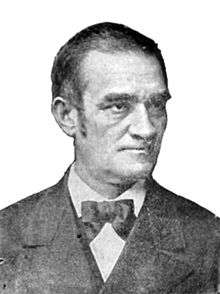Gheorghe Chițu

Gheorghe Chițu (August 24, 1828 – October 27, 1897) was a Wallachian, later Romanian lawyer and politician.
Born in Oboga, Olt County, in the Oltenia region, his father was a waistcoat merchant with some knowledge of Greek literature. He attended primary school in Craiova. A protégé of Prince Gheorghe Bibescu, he was sent to continue his studies at Saint Sava College in Bucharest.[1] Upon graduation, he taught classical languages there.[2] He subsequently entered the University of Vienna, where he obtained a law degree. An active supporter of the Wallachian Revolution of 1848, he was named director of propaganda for Oltenia. He practiced law in Craiova and from 1857 to 1860 edited Vocea Oltului gazette,[1] which he founded upon his return from Austria.[2] Entering the magistracy, he became president of the Dolj County tribunal and a prosecutor at the Craiova appeals court. He resigned in 1867 in order to resume work as a lawyer.[1]
Chițu served as the elected mayor of Craiova. A liberal, in May 1875 he was among the founders of the National Liberal Party, signing its new platform. Between 1867 and 1888, he was elected to multiple terms as Deputy and Senator,[1] representing Craiova.[2] His first cabinet post was as Religious Affairs and Education Minister; he served under Ion C. Brătianu from July 1876 to October 1878. He founded the commercial school in Craiova and taught commercial law there from 1878 to 1891.[1] Chițu also taught law at the University of Bucharest.[2] He was Finance Minister from December 1881 to January 1882,[1] Justice Minister from January to August 1882[3] and interim Justice Minister from September to November 1883. In May 1881, when Austria-Hungary was attempting to use the Treaty of Berlin in order to gain control of the Danube between Galați and the Black Sea, he addressed the Assembly of Deputies on the subject.[1]
Chițu was as Interior Minister from August 1882 to June 1884. In late 1882, he oversaw the adoption of an 1864 administrative law; the changes dealt with the manner of confirming mayors in office, their power to maintain public order and the position of police chief.[4] As minister, he issued a damning report on the Bucharest City Council, accusing it of mismanaging funds and incompetence in overseeing modernization works. As a result, the council was dissolved in October 1883, with new elections held early the following year. In 1884, he presided over the disbanding of the Civic Guard. Established in 1866, this institution's mission was to maintain public order and safety and help defend cities in time of war. Because most of its members came from lower social classes and were of a combative disposition, conservative politicians pressed for their dissolution, with certain mayors defunding the guards. In 1882, their budgetary shortfall widened; meanwhile, more modern police institutions were appearing in Europe, so the time seemed fit to do away with them.[5] In early 1884, when tensions over modifying the Constitution spilled over into street protests that aimed to install Bibescu's son as king,[6] Chițu helped lead a successful effort to disperse the crowd and restore order.[7]
His final term in government was a second stint as Education Minister, from June 1884 to February 1885.[3] In 1879, he was elected a titular member of the Romanian Academy.[8] From 1887 to 1888, he served as president of the Society for the Education of the Romanian People.[7] Chițu retired from politics in 1888.[2] He died in Mirila village near his birthplace.[7]
Notes
- 1 2 3 4 5 6 7 Grigore and Șerbu, p. 99
- 1 2 3 4 5 Dimitrie Rosetti, Dicționarul Contimporanilor, p. 53. Editura Lito-Tipografiei "Populara", Bucharest, 1897
- 1 2 Constantin Bacalbașa, Bucureștii de altădată III (1884-1888), p. 249. Editura Humanitas, Bucharest, 2014. ISBN 973-504-680-6
- ↑ Grigore and Șerbu, p. 99-100
- ↑ Grigore and Șerbu, p. 100
- ↑ Grigore and Șerbu, p. 100-01
- 1 2 3 Grigore and Șerbu, p. 101
- ↑ (Romanian) Membrii Academiei Române din 1866 până în prezent at the Romanian Academy site
References
- Constantin Grigore and Miliana Șerbu, Miniștrii de interne (1862–2007), Editura Ministerului Internelor și Reformei Administrative, Bucharest, 2007. ISBN 978-97374-504-8-7